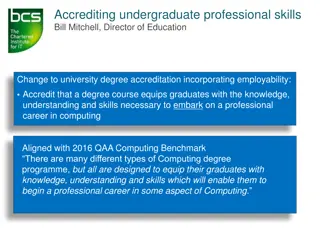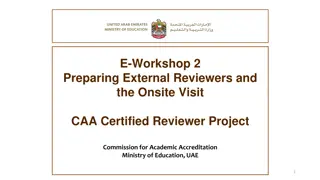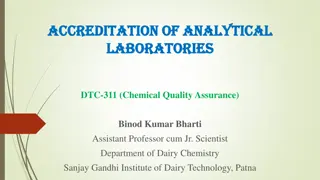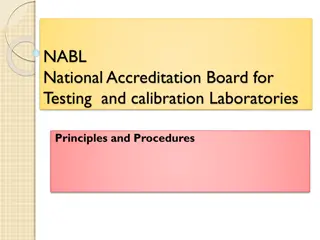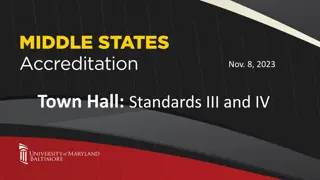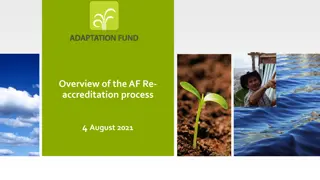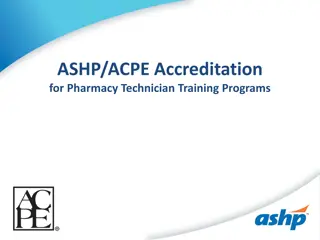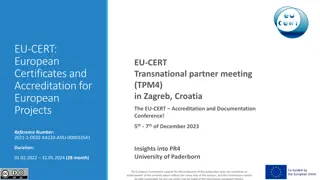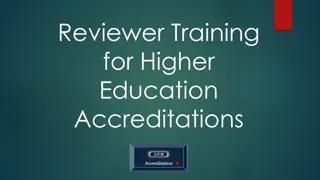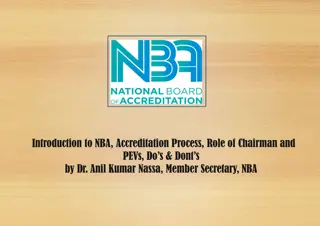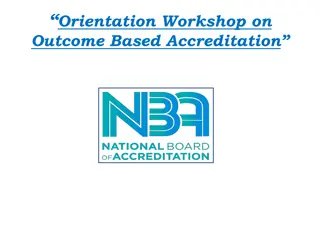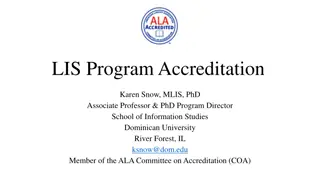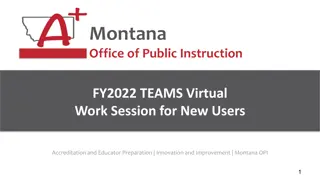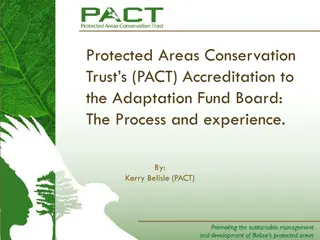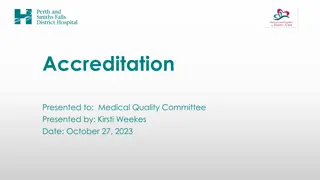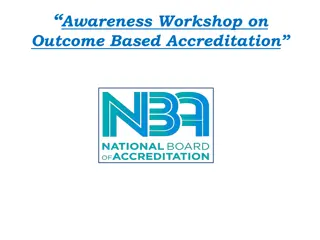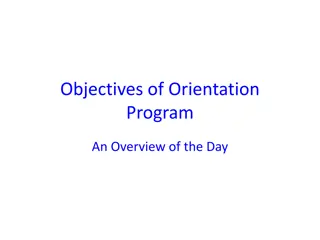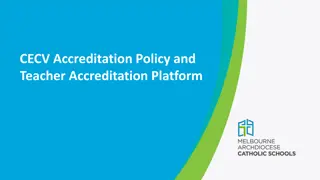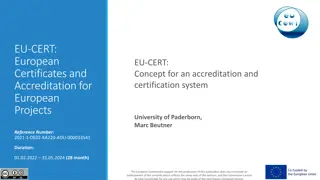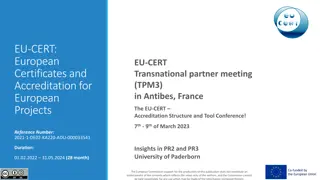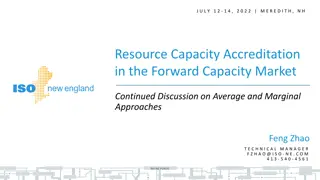Understanding Post University Accreditation Process
Accreditation is crucial for universities to ensure quality services for students. Reaffirmation of accreditation, done every ten years, involves demonstrating compliance with standards and policies. Post University has a detailed accreditation timeline and process, including self-study and on-site evaluations. The self-study component focuses on reflecting the institution's past, present, and future, promoting continuous planning and improvement.
Download Presentation

Please find below an Image/Link to download the presentation.
The content on the website is provided AS IS for your information and personal use only. It may not be sold, licensed, or shared on other websites without obtaining consent from the author. Download presentation by click this link. If you encounter any issues during the download, it is possible that the publisher has removed the file from their server.
E N D
Presentation Transcript
Post University - Reaffirmation 2024 52 Years of Continuous Accreditation A Total University Effort t 1
What is the purpose of accreditation? Ensure we deliver quality services to our students. Meet best practice standards Deliver services with appropriately trained staff and faculty Include students in the decision- making process Provide services in a safe and respectful environment Protect students privacy Support positive outcomes 2
Accreditation Triad Accreditation Triad 3
What is reaffirmation of accreditation? Every ten years, colleges and universities accredited by NECHE must demonstrate that they comply with the nine standards contained in the Standards of Accreditation and with the policies and procedures. This process is called reaffirmation of accreditation. 4
Post University Accreditation Timeline Continually Accredited Since 1972 Last Reaffirmation 2014 Interim Report Submitted January 2019 Self-Assessment 2022 - 2023 Self-Study Committees Established Total of Nine 2022 Self-Study Draft Due May 5, 2023 (No Extensions) NECHE Staff Review of Self-Study August 2023 Self-Study Final Submission Due to NECHE February 11, 2024 Reaffirmation Visit March 24-27, 2024 5
Reaffirmation - Three Components An institutional self-study, in which the institution evaluates how well it meets NECHE sStandards for Accreditation and makes realistic, specific projections for improvement. An on-site evaluation by a trained group of peers, which provides a valuable external perspective to the institution and to the Commission. A review and decision by the Commission. 6
Component One Self-Study The institutional self-study is a written document that addresses the requirements as stated in the Standards for Accreditation. Presents a clear, concise, and accurate picture of the institution as a dynamic entity with a sense of its history (DESCRIPTION), an understanding of its present (APPRAISAL), and a vision of its future (PROJECTION). The self-study process encourages ongoing planning and evaluation, it is not an isolated phenomenon that occurs only when an evaluation team is expected. 7
Self-Study What are the components of a self-study? Cover Page (More Detail Later) Table of NECHE Actions, Areas of Emphasis, or Concerns Introduction Discussion of How We Approached the Process Institutional Overview Narrative (Nine Standards) Description, Appraisal, Projection Appendix - NECHE Information Forms, Financial Information, Supporting Documentation Narrative Approximately 100 Pages in Length 8
Standard One Committee Standard One Mission and Purposes The institution s mission and purposes are appropriate to higher education, consistent with its charter or other operating authority, and implemented in a manner that complies with the Standards of the New England Commission of Higher Education. The institution s mission gives direction to its activities and provides a basis for the assessment and enhancement of the institution s effectiveness. Standard One Mission and Purposes Chair: Tom Bryant, Vice President of Accreditation Committee Members: Shawn Fields, Associate Director of Accreditation Joe Lodewyck, Director of Assessment Melissah Kochera, Executive Assistant to the CEO Joan Huwiler, Director of University Communications 9
Standard Two Committee Standard Two Planning and Evaluation The institution undertakes planning and evaluation to accomplish and improve the achievement of its mission and purposes. It identifies its planning and evaluation priorities and pursues them effectively. The institution demonstrates its success in strategic, academic, financial, and other resource planning and the evaluation of its educational effectiveness. Standard Two Evaluation and Planning Chair: Jeanna Sinn, Senior Vice President of Operations Committee Members: Jennifer Zaniewski, Vice President Enrollment *Jennifer Nicknair, Sr. Director, Institutional Effectiveness & Strategic Operations Jennifer Peffers, Director of Admissions ADP Victoria Meehan, Director of Enrollment Kristi Burrell, Director of Strategy and Analysis Frank Monteiro, Chief of Staff 10
Standard Three Committee Standard Three Organization and Governance Chair: Shawn Fields, Associate Director of Accreditation Committee Members: Tom Bryant, Vice President of Accreditation Melissah Kochera, Executive Assistant to the CEO Wesley Debnam, Sr. Vice President of Culture, Diversity, & Associate Experience Kristin McDonald, Associate Program Chair of Human Services and Sociology Abigail Nemec, Program Chair Equine Studies Sarah Meeks, Chair Bachelor of Science Nursing Program Kristine Skalsky, Chair, Research and Scholarship Hamid Malakpour, Program Chair Finance Michelle Hubbell, Director Military & Graduate Admissions Standard Three Organization and Governance The institution has a system of governance that facilitates the accomplishment of its mission and purposes and supports institutional effectiveness and integrity. Through its organizational design and governance structure, the institution creates and sustains an environment that encourages teaching, learning, service, scholarship, and where appropriate, research and creative administrative capacity by assuring provision of support adequate for the appropriate functioning of each organizational component. The institution has sufficient autonomy and control of its programs and operations consistent with its mission to be held directly accountable for meeting the Commission s Standards for Accreditation. activity. It demonstrates 11
Standard Four Committee Standard Four The Academic Program Chair: Beth Johnson, Provost Committee Members: Caitlyn Masiewicz, University Registrar Melissa Kendall, Senior Associate Registrar Lucia Dressel, Assistant Dean for General Education Alisa Hunt, Assistant Dean of Graduate Business Studies Brenda Helmer, Chair, Master of Science Nursing American Sentinel College of Nursing and Health Sciences Stephanie Payzant, Director of Instructional Design Dawn Sherman, Dean, School Continuing Education Andrew Smith, Assistant Dean, John P. Burke School of Public Service and Education Yolanda Smith, Assistant Dean, American Sentinel College of Nursing and Health Sciences Standard Four The Academic Program The institution s academic programs are consistent with and serve to fulfill its mission and purposes. The institution works systematically and effectively to plan, provide, oversee, evaluate, improve, and assure the academic quality and integrity of its academic programs and the credits and degrees awarded. The institution sets a standard of student achievement appropriate to the degree or certificate awarded and develops the systematic means to understand how and what students are learning and to use the evidence obtained to improve the academic program. 12
Standard Five Committee Standard Five Students Chair: Devon Putnam, Director of Student Engagement Committee Members: Victoria Meehan, Director of Enrollment Scott Allen, Senior Vice President Jennifer Labate, Director of Title IX and Disability Services Jewel Williams, Vice President Regulatory Compliance Gregory Dennis, Director of Center for Academic Success Jennifer Zaniewski, Vice President Enrollment Stephanie Caban, Program Chair - Management and Baldrige Diversity Officer Tom Kavanagh, Director of Enrollment Financial Aid and Technology Jeff Olsen, Vice President Student Experience and Dean of Students Standard Five Students Consistent with its mission, the institution sets and achieves realistic goals to enroll students who are broadly representative of the population the institution wishes to serve. The institution addresses its own goals for the achievement of diversity, equity, and inclusion among its students and provides a safe environment that fosters the intellectual and personal development of its students. It endeavors to ensure the success of its students, offering the resources and services that provide them the opportunity to achieve the goals of their educational program as specified in institutional publications. The institution s interactions with students and prospective students are characterized by integrity and equity. 13
Standard Six Committee Standard Six Teaching, Learning, and Scholarship Chair: Jeremi Bauer, Dean The Malcolm Baldridge School of Business Committee Members: Elizabeth Kranz, Dean School of Arts and Sciences James Loughran, Program Chair of Graduate Business Studies Michael Wolter, Assistant Dean of Undergraduate Programs Kristine Skalsky, Chair of Research and Scholarship Breana Sanchez, Associate Director of Enrollment-Advising David Renza, Associate Director Academic Success and Retention Standard Six Teaching, Learning, and Scholarship The institution supports teaching and learning through a well-qualified faculty and academic staff, who, instructors and processes appropriate to the institution, collectively ensure the quality of instruction and support for student learning. Scholarship, research, and creative activities receive support appropriate to the institution s mission. The institution s faculty has primary responsibility for advancing the institution s academic purposes through teaching, learning, and scholarship. 14
Standard Seven Committee Standard Seven Institutional Resources The institution has sufficient human, financial, information, physical, and technological resources, and capacity to support its mission. Through periodic evaluation, the institution demonstrates that its resources are sufficient to sustain the quality of its educational program and to support institutional improvement now and in the foreseeable future. institution demonstrates, through verifiable internal and external evidence, its financial capacity to graduate its entering class. institution administers its resources in an ethical manner and assures effective systems of enterprise risk management, regulatory compliance, internal controls, and contingency management. Standard Seven Institutional Resources Chair: Carey Cseszko, Controller Committee Members: Jay Kim, Vice President Financial Services/Bursar Donna Prudhomme, Chief Financial Officer Tracy Ralston, Library Director Greg Theisen, Chief Information and Technology Officer Myla Wilson, Associate Director of Regulatory Compliance Dennis Zancan, Facilities Manager Robert Acosta, Cybersecurity Analyst Frank Kuster, Associate Experience Generalist The The 15
Standard Eight Committee Standard Eight Educational Effectiveness Chair: *Jennifer Pisco, Senior Director of Student Engagement Committee Members: Devon Putnam, Director of Student Engagement Joe Lodewyck, Director of Assessment Gina Wellman, Director of Academic First Year Experience Elizabeth Kranz, Dean, School of Arts and Sciences Brenda Helmer, Chair, MSN Program Roger Caramanica, Program Chair, Gaming and Esports Management Darren Cesca, Default Management Leader Shelley Cote, Director of Student Accounts Standard Eight Educational Effectiveness The institution demonstrates its effectiveness by ensuring satisfactory levels of student achievement outcomes. Based on verifiable information, the institution understands what its students have gained as a result of their education and has useful evidence about the success of its recent graduates. This information is used for planning and improvement, resource allocation, and to inform the public about the institution. Student achievement is at a level appropriate for the degree awarded. on mission-appropriate student 16
Standard Nine Committee Standard Nine Integrity, Transparency, and Public Disclosure The institution subscribes to and advocates high ethical standards in the management of its affairs and in its dealings with students, prospective students, faculty, staff, its governing board, external agencies and organizations, and the general public. Through its policies and practices, the institution endeavors to exemplify the values it articulates in its mission and related statements. In presenting the institution to students, prospective students, and other members of the public, the institutional website provides information, including information about student success, that is complete, accurate, timely, readily accessible, clear, and sufficient for intended audiences to make informed decisions about the institution. Standard Nine Integrity, Transparency, and Public Disclosure Chair: *Rich Schechter, Chief Marketing Officer Committee Members: Joan Huwiler, Director of University Communications Michele Bartlett, Director Website Development & Visual Branding JC Hopkins, Director of Marketing Sean Cooley, Director of Marketing Analysis & Lead Generation Wesley Debnam, SVP Culture, Diversity & Associate Experience 17
Component Two On-site Evaluation On-site evaluation by a group of faculty and administrators provides the institution and the Commission with a valuable external perspective. On-site evaluation team members are selected and trained based upon their experience at an institution comparable to the one being evaluated. On-site evaluation team members: oReview all areas of operation. oInterview management, staff, faculty, and students. oValidate what we state in our self-study is accurate. 18
Component Three Commission Review Final Reaffirmation Decision Based Upon: Commission review of the self-study. Commission review of the evaluation team s report. Institution s response to the evaluation team s report. Commission will make a final decision of reaffirmation. 19
How can YOU prepare? Review the NECHE Standards of Accreditation https://www.neche.org/resources/standards-for-accreditation Review the Policies in the University s Catalog https://post.edu/student-services/academic-affairs/university-catalog/ Follow the Policies and Procedures Relating to Your Department and Particularly Your Position Be Familiar with and Understand Applicable Handbooks Participate in All Accreditation and Position Specific Training Activities Volunteer Opportunities and ASK QUESTIONS 20
Keep Updated Reaffirmation Website https://post.edu/about/reaffirmation-2024/ Dr. Jeremi Bauer Lucia Dressel Gregory Dennis Tom Kavanagh 21


